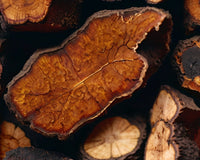What are shiitake mushrooms?
Nutritional content of shiitake mushrooms
The nutritional content of 4 dried shiitake mushrooms (15 grams) is:
- Calories: 44
- Carbohydrates: 11 grams
- Fiber: 2 grams
- Protein: 1g
- Riboflavin: 11% of Daily Value (DV)
- Niacin: 11% of DV
- Copper: 39% of DV
- Vitamin B5: 33% of DV
- Selenium: 10% of DV
- Manganese: 9% of DV
- Zinc: 8% of DV
- Vitamin B6: 7% of DV
- Folic acid: 6% of DV
- Vitamin D: 6% of DV
In addition, shiitake mushrooms contain many of the same amino acids as meat. They also possess polysaccharides, terpenoids, sterols and lipids, some of which have immune-enhancing, cholesterol-lowering and anti-cancer effects. The amount of bioactive compounds in shiitake mushrooms depends on how and where the mushrooms are grown, stored and prepared.
How are they used?
Shiitake Mushrooms as a Whole Food
You can cook with both fresh and dried shiitake mushrooms, although dried is more popular. Dried shiitake mushrooms have a more intense umami flavor than fresh ones. Umami can be described as salty or meaty. It is often considered the fifth taste, along with sweet, sour, bitter and salty. Both dried and fresh shiitake mushrooms can be used in stir-fries, soups, stews, and other dishes.
Shiitake Mushrooms as a Supplement
Shiitake mushrooms have long been used in traditional Chinese medicine. They are also part of the medical traditions of Japan, Korea, and eastern Russia. In traditional Chinese medicine, shiitake mushrooms are believed to promote health and longevity, as well as improve blood circulation. Research shows that some bioactive compounds in shiitake mushrooms may protect against cancer and inflammation. However, many studies are conducted in animals or test tubes rather than in people. Animal studies often use doses far beyond what people typically get from food or supplements. Additionally, many mushroom-based supplements on the market have not been tested for effectiveness. Although the proposed benefits are promising, more research is needed.
May help heart health
- Elidenin. This compound inhibits enzymes involved in the production of cholesterol.
- Sterol. These molecules help block the intestinal absorption of cholesterol.
- Beta-glucan. This fiber can lower cholesterol.
One study on hypertensive rats found that shiitake mushroom powder prevented increases in blood pressure. A study of laboratory rats fed a high-fat diet showed that rats that ate shiitake mushrooms had less fat in their livers, less plaque on their arterial walls, and lower cholesterol levels than rats that didn't eat any mushrooms. Still, these effects need to be confirmed in human studies before any solid conclusions can be drawn.
May strengthen your immune system
Contains compounds with potential anticancer activity
Other potential benefits
Promising antibacterial and antiviral effects
Several compounds in shiitake mushrooms have antibacterial, antiviral, and antifungal effects. As antibiotic resistance increases, some scientists believe it is important to explore the antibacterial potential of shiitake mushrooms. That said, while the isolated compounds showed antibacterial activity in test tubes, eating shiitake mushrooms is unlikely to have any effect on viral, bacterial or fungal infections in humans.
Can strengthen your bones
Mushrooms are the only natural plant source of vitamin D. Your body needs vitamin D to build strong bones, but few foods contain this important nutrient. The vitamin D levels of mushrooms depend on how they are grown. When exposed to UV rays, they produce higher levels of this compound. In one study, mice fed a low-calcium, low-vitamin D diet developed symptoms of osteoporosis. In contrast, those given calcium and UV-enhanced shiitake mushrooms had higher bone density. However, keep in mind that shiitake mushrooms provide vitamin D2. This is an inferior form compared to vitamin D3, which is found in fatty fish and some other animal foods.
possible side effects
How to cook with shiitake mushrooms
You can cook shiitake mushrooms the same way you cook other mushrooms. Here are some suggestions:
- Saute mushrooms with vegetables and serve with boiled eggs.
- Add them to pasta dishes or stir-fries.
- Use them to make delicious soups.
- Roast them for a crispy snack or side dish.





